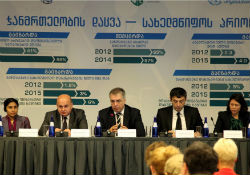WHO recommends additional public investment to build on health coverage achievements in Georgia

David Kharatishvil, photographer for the Ministry of Labour, Health and Social Affairs.
At a recent high-level meeting in Tbilisi, Georgia, experts from WHO/Europe and the World Bank presented recommendations for the country to build on its achievements in moving towards universal health coverage.
A further increase in public spending on health and improving the efficiency of the health system, both directed at improving financial protection for the population, were among the recommendations from WHO, based on a 2014 survey on health care utilization and expenditure and recent analysis of financial protection.
The Ministry of Labour, Health and Social Affairs of Georgia organized the meeting on 22 July to update partners, representatives of international organizations and other health system stakeholders on the progress of the national health care reform which launched in 2013. The Minister of Finance and the Deputy Minister of Economy and Sustainable Development, Georgia also attended the event.
In his opening statement, David Sergeenko, Minister of Health, Labour and Social Affairs commented, “Three years since the start of the health reform process, the message from the World Health Organization and the World Bank is clear: the reform is moving in the right direction, although some challenges remain in providing universal access to health care.”
Analysis supported by WHO/Europe shows how out-of-pocket payments for medicines are the most important source of financial hardship for people in Georgia. Reducing out-of-pocket payments will require actions to bring down medicine prices, encourage rational prescribing and use of medicines, extend publicly financed coverage of medicines and enhance protection, especially for poorer people.



